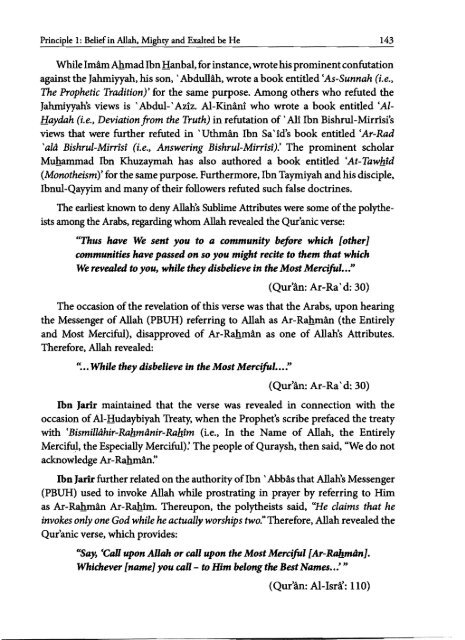Guide-to-Sound-Creed-A-Book-on-Muslim-Creed-and-Faith
Guide-to-Sound-Creed-A-Book-on-Muslim-Creed-and-Faith
Guide-to-Sound-Creed-A-Book-on-Muslim-Creed-and-Faith
Create successful ePaper yourself
Turn your PDF publications into a flip-book with our unique Google optimized e-Paper software.
Pri.,ri,."I"I: Belief in Allah,<br />
<strong>and</strong> Exalted be He<br />
143<br />
While Imam Ahmad Ibn Hanbal, for instance, wrote his prominent c<strong>on</strong>futati<strong>on</strong><br />
against the Jahrniyyah, his s<strong>on</strong>, 'Abdullah, wrote a book entitled 'As-Sunnah (i.e.,<br />
The Prophetic Traditi<strong>on</strong>)' for the same purpose. Am<strong>on</strong>g others who refuted the<br />
Jahmiyyah's views is 'Abdul-'Aziz. Al-Kinruu who wrote a book entitled 'AI<br />
Haydah (i.e., Deviati<strong>on</strong> from the Truth) in refutati<strong>on</strong> of'Ali Ibn Bishrul-Mirrisi's<br />
views that were further refuted in 'Uthman Ibn Sa'id's book entitled 'Ar-Rad<br />
'ala Bishrul-Mirrisi (i.e., Answering Bishrul-Mirrisi).' The prominent scholar<br />
Muhammad Ibn Khuzaymah has also authored a book entitled 'At-Tawhid<br />
(M<strong>on</strong>otheism), for the same purpose. Furthermore, Ibn Taymiyah <strong>and</strong> his disciple,<br />
Ibnul-Qayyim <strong>and</strong> many oftheir followers refuted such false doctrines.<br />
The earliest known <str<strong>on</strong>g>to</str<strong>on</strong>g> deny Allah's Sublime Attributes were some ofthe polytheists<br />
am<strong>on</strong>g the Arabs, regarding whom Allah revealed the Qur'anic verse:<br />
"Thus have We sent you <str<strong>on</strong>g>to</str<strong>on</strong>g> a community before which [other]<br />
communities have passed <strong>on</strong> so you might recite <str<strong>on</strong>g>to</str<strong>on</strong>g> them that which<br />
We revealed <str<strong>on</strong>g>to</str<strong>on</strong>g> you, while they disbelieve in the Most Merciful ••!'<br />
(Qur'an: Ar-Ra'd: 30)<br />
The occasi<strong>on</strong> of the revelati<strong>on</strong> of this verse was that the Arabs, up<strong>on</strong> hearing<br />
the Messenger of Allah (PBUH) referring <str<strong>on</strong>g>to</str<strong>on</strong>g> Allah as Ar-Rahman (the Entirely<br />
<strong>and</strong> Most Merciful), disapproved of Ar-Rahman as <strong>on</strong>e of Allah's Attributes.<br />
Therefore, Allah revealed:<br />
'~ .. While they disbelieve in the Most Merciful•••:'<br />
(Qur'an: Ar-Ra' d: 30)<br />
Ibn Jadr maintained that the verse was revealed in c<strong>on</strong>necti<strong>on</strong> with the<br />
occasi<strong>on</strong> ofAl-Hudaybiyah Treaty, when the Prophet's scribe prefaced the treaty<br />
with 'Bismilldhir-Rahmdnir-Rahim (i.e., In the Name of Allah, the Entirely<br />
Merciful, the Especially Merciful): The people of Quraysh, then said, "We do not<br />
acknowledge Ar-Rahman:'<br />
Ibn Jark further related <strong>on</strong> the authority ofIbn 'Abbas that Allah's Messenger<br />
(PBUH) used <str<strong>on</strong>g>to</str<strong>on</strong>g> invoke Allah while prostrating in prayer by referring <str<strong>on</strong>g>to</str<strong>on</strong>g> Him<br />
as Ar-Rahman Ar-Rahim. Thereup<strong>on</strong>, the polytheists said, ''He claims that he<br />
invokes <strong>on</strong>ly <strong>on</strong>e God while he actually worships two." Therefore, Allah revealed the<br />
Qur'anic verse, which provides:<br />
"Sa}) 'CaD up<strong>on</strong> Allah or call up<strong>on</strong> the Most Merciful [Ar-R.aI!mtln].<br />
Whichever [name] you caR - <str<strong>on</strong>g>to</str<strong>on</strong>g> Him bel<strong>on</strong>g the Best Names .... "<br />
(Qur'an: Al-Isd.': 110)


